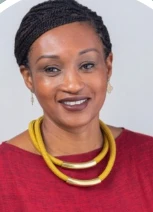 Photo credit: Getty Images.
Photo credit: Getty Images.
Many companies in emerging market and developing economies (EMDEs) are now prioritizing climate action and advancing gender inclusiveness. However, there are still too few bringing these two goals together in an integrated, comprehensive, and strategic way.
Why should they? Because we know that including women’s perspectives and talents is crucial for driving climate mitigation and adaptation as well as facilitating the transition to clean energy.
We have seen how businesses in EMDEs with higher proportions of women in senior management and board positions are more likely to have formalized, effective commitments when it comes to climate action. So, we must approach these priorities—climate action and gender inclusion—as two sides of the same coin, and double down on the value of women’s leadership in driving robust corporate actions to confront the climate crisis.
Still, several barriers stand in the way of most companies in EMDEs as they seek to integrate climate and gender. These include:
- Lack of knowledge or training on the climate-gender nexus
- Silos between environmental, social, and governance teams within companies
- Low awareness of the business case for integrated gender and climate approaches
- Funding and budget constraints
- Complex gender and climate disclosure and engagement processes
- A lack of tools and frameworks to address the issue.
Another roadblock is too few women in leadership roles. Globally, women hold less than 25 percent of board seats, fewer than 20 percent of CFO positions, only 10 percent of board chair positions, and a mere 6 percent of CEO positions, according to Deloitte 2023.
The International Finance Corporation’s (IFC) latest report, Gender-Responsive Climate Governance and the Role of Women Leaders, identifies concrete actions various stakeholders, including companies, can take to bring about the climate benefits that tend to accrue when more women are in positions of leadership. It draws on interviews and focus groups with international experts and business leaders, along with a global survey of business practitioners from companies in EMDEs.
Table: Roles boards, executives, regulators, investors, development finance institutions, and others can play to spur climate action and gender inclusivity.
Source: Gender-Responsive Climate Governance and the Role of Women Leaders, IFC, 2024.
We are already seeing some companies promoting the gender and climate nexus.
Indonesia’s Bluebird Group, for example, is a women-founded company offering ride-hailing, logistics, and transport services. It is focused on electric vehicles and expanding the electric transport infrastructure, while making sure more women are represented in leadership. The company implements gender-inclusive policies and practices around transport safety to attract and retain women employees and supports programs for women in business.
In Pakistan, Jazz, the country’s largest telecom provider, hired an environmental consultant to lead work on climate change and the environment and to support women in the community who experienced climate impacts during the 2022 floods.
Neoenergia Elektro in Brazil received an innovative IFC sustainability-linked loan, in which pricing is tied to corporate targets for climate and gender. It focuses on digitalizing networks and reducing greenhouse gas emissions while increasing female electricians in its workforce. The goal is to attract more women into the electrical sector, which is currently occupied mainly by men.
We need more examples like these. With just about half of large companies in EMDEs making commitments to address climate-related risks and opportunities, compared to 71 percent in developed economies, there is clearly room to do more.
The journey toward effective, inclusive climate governance in EMDE-based companies requires a steadfast commitment to navigating the complex dynamics between climate and gender in an integrated way. By embracing this commitment and turning it into a roadmap for action, companies can contribute meaningfully both to impactful climate action and women’s empowerment.




Join the Conversation